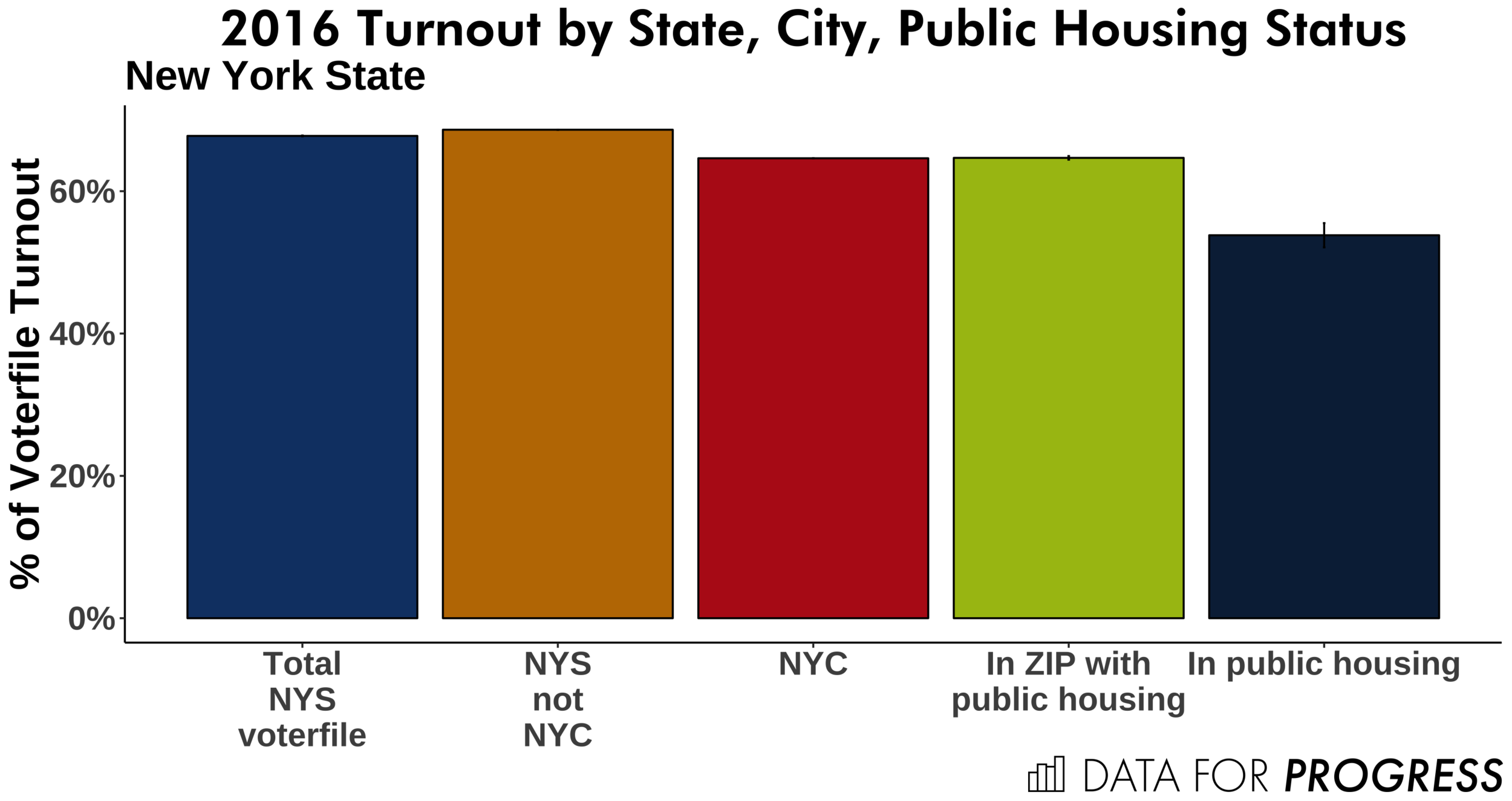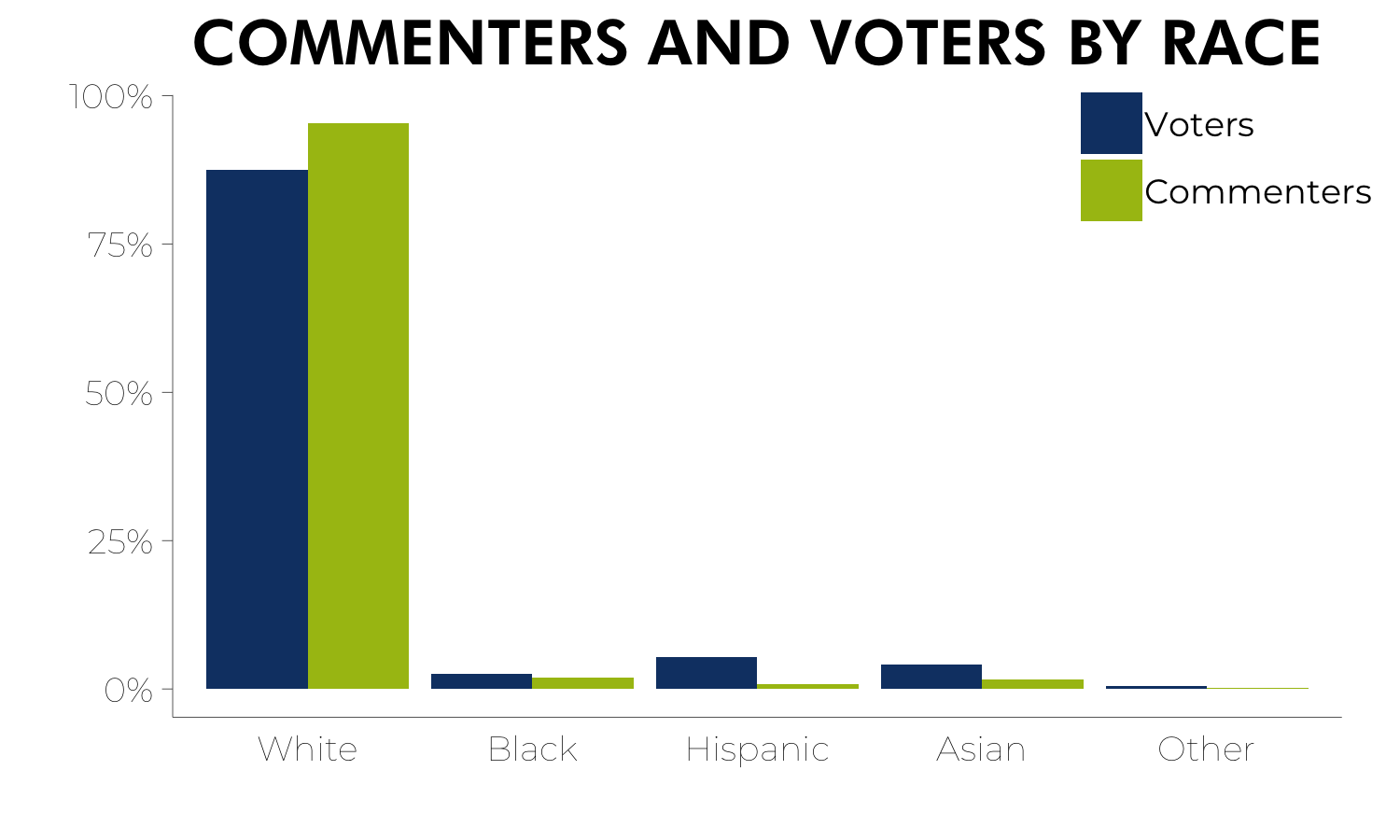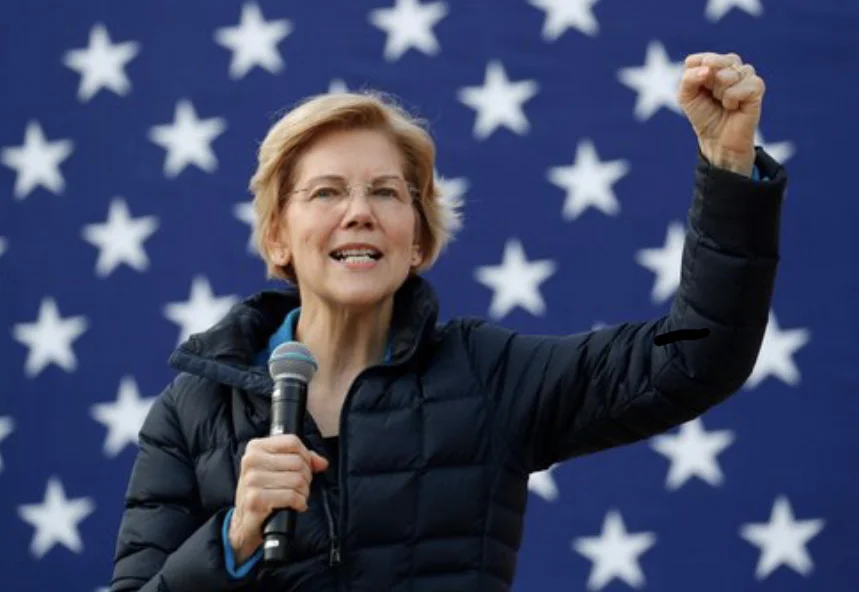Using the New York State voterfile made available by the New York State Board of Elections, Data for Progress geocoded active voters to understand the role that public housing status plays in election turnout. Here, we focus on turnout in the November 8, 2016 general election. While statewide turnout in 2016 was about 57 percent of the vote-eligible population, here we report turnout as a percent of those who are active on the NYS voterfile. Using the active voterfile as the denominator, our reported numbers will appear higher than this 57 percent baseline. This is because we report turnout among active voters, not among the entire vote-eligible population.
Read MoreMany American cities are facing housing crises, with rapidly escalating prices placing homeownership, reasonable commutes, and even safe and secure housing out of the reach of middle- and lower-income Americans. Most economists believe that, to address this problem, we need to increase the supply of market-rate housing in these high-cost cities. Despite widespread consensus on the need to build more housing, housing shortages persist across many urban areas. Why, if most informed observers, and many city leaders, believe that we need more housing, are most cities failing to keep pace with growing housing demand?
Read MoreYesterday, Elizabeth Warren reintroduced her expansive housing bill, including several notable additions since we released our analysis. We are not above humblebragging that it incorporates some of our suggestions. Though it still doesn’t include everything we think is necessary for a transformative progressive housing agenda, her willingness to take feedback and improve her proposal is a testament to how seriously Warren is taking housing. So far, no other candidate can claim that. Here’s what’s new.
Read MoreThere are 4.4 million American citizens who do not have voting representation in Congress. Puerto Rico, the District of Columbia, Guam, the US Virgin Islands, the Northern Mariana Islands, and American Samoa are all technically part of the United States, but have no voice in the federal government since they are not states. This can have very real consequences; in the disastrous wake of Hurricane Maria, Puerto Ricans had no one to advocate for them in Washington. More fundamentally, this lack of representation goes against everything America stands for. We are the oldest and largest democracy on the planet, yet we routinely ignore the concerns of millions of our citizens.
In recent years, the question of DC and Puerto Rican statehood has gained prominence, especially among progressives. The other territories are generally considered too small to become states, but DC has more residents than either Vermont or Wyoming, while Puerto Rico would become the 29th most populous state. Both also contribute significantly to the federal economy. Though Puerto Ricans don’t have to pay federal income taxes, they still pay a variety of payroll taxes, sales taxes, and tariffs that cumulatively add up to more than the taxes paid by six states. Similarly, DC paid more in federal taxes than 22 states in 2015. Yet neither of these territories have any say in what taxes are leveled. As DC license plates say, this is a clear case of taxation without representation.
Read MoreOn Friday, the newly Democratic-led House passed HR1 which includes, among many commonsense voting reforms and electoral protections, endorsement of DC statehood. Perhaps surprisingly, this is the first-ever piece of legislation to pass the House officially endorsing voting rights for the District, which has a higher population than Wyoming, Vermont, and every other non-voting US territory besides Puerto Rico.
From January 25 to 29, 2019, Data for Progress fielded a survey of 1,282 US voters with YouGov Blue. On that survey, we asked voters about statehood for both Washington, DC and Puerto Rico. While Republicans were quick to attack HR1 as a “power grab,” our results were clear: DC statehood and Puerto Rico statehood are both popular.
Read MoreThe political economy is lining up behind a Green New Deal, but support among Democrats and Republicans in the Senate seems to be lagging.
When U.S. Senator Ed Markey from Massachusetts introduced a resolution in the Senate calling for the creation of a Green New Deal in early February, it had 12 Democratic cosponsors, including Markey. In a month’s time, it still has...12 cosponsors. Opinion-makers will say that the seeminging untenable and tangential components of the resolution are keeping other Democrats away--the general commitments to universal healthcare, affordable housing, and economic security. Yet these goals are just that: aspirations of what the Federal government should aim to achieve for the country, not specific policy prescriptions that chain a Senator to vote they might regret in the future.
What is conveyed more concretely in the Green New Deal resolution is the large mobilization of federal resources to accelerate the transition away from fossil fuels and toward clean, renewable, and carbon-free energy and create millions of new jobs in the process. This transition is not some “green pipe dream”; it’s actually underway and quite far along in some states.
Read MoreThis year, the entire Virginia state legislature is up for election. Democrats are currently favored to take the House of Delegates and State Senate, which means the next session has enormous potential for ambitious progressive policies like a state-level Green New Deal.
But that won’t happen if Dominion Energy continues to run the state.
We need true progressives to replace corporate Dominion Energy allies in the House of Delegates and State Senate.
That’s why we’re launching the Progressive Virginia Project, to support progressives in Virginia’s upcoming primaries.
Read Moredata data data data
Read MoreThe Green New Deal is likely one of the most talked about progressive political programs in a long time. The explosions of conversation about it on Twitter is clear, and with the introduction of Senator Markey and Representative Occasio-Cortez’s resolution there is now a clear focus on specific goals and plans. Recent Data for Progress / YouGov Blue polling has shown broad support for the resolution with 43 percent of Americans in support and 38 percent opposed, even when voters are told it will require tax hikes.
To dig deeper into why people are supporting or opposing the Green New Deal we asked Civis Analytics to survey 4,380 Americans and asked them if they support, oppose or are undecided about the Green New Deal and then followed up to ask why they had that position. To understand the responses we analyzed the results looking at what words were more common among supporters versus those who opposed plan. We again used the probabilistic model described here where each word was given a probability of being used for each group and then we look at the differences between the two groups.
Read MoreIn our newest blog on the meaning and measurement of the working class, we are going to dive into the specific words that individuals and groups used to describe what it means to be working class in America. What I find is that Republicans use a much wider understanding of working class, meaning anyone who works, while Democrats focus more on precarity. In addition those who face little precarity are more likely to use more traditional definitions of working class based on types of jobs and education.
In order to analyze text differences, I used the method proposed by Monroe, Colaresi and Quinn (2008) and implemented in the SpeedReader package available on github. Unlike many text analysis methods, they suggest a model based approach where the words used in the text are seen as the probabilistic result of different groups with different propensities to select words. From this framework it is possible to compare the probability of using different words by each group.
Read MoreFollowing the 2018 midterms, more women than ever were elected to both state legislatures and the U.S. Congress. Prior to 2018, about 25 percent of state legislatures, and 20 percent of Congressional seats were held by women. After the November races, those numbers increased to about 29 percent and 24 percent respectively. Although more women than ever were elected to Congress, only one in ten is a Republican; overall, the share of women in Congress who are Republican is down from last session from 29 to 21. Compare that to Democrats, who went from 81 women in Congress to 106. For several decades Republicans have been falling behind Democrats on this metric, but 2018 was especially bad for them.
The notion that a party represents “people like me” is central to much research on voter motivation. The decline in the share of women among Republican office-holders, and the increase among Democratic office-holders led us to investigate which women legislators voters associate most with each party. As part of our January national issues survey, we posed a simple task to the 1,282 US voters in our sample: Name a woman who currently holds office somewhere in the United States. Specifically, we asked:
Please name any Democratic woman who currently holds elected office somewhere in the United States.
and:
Please name any Republican woman who currently holds elected office somewhere in the United States.
Read MoreThe next President of the United States will give a shit about housing.
The average American spends far more on housing than any other expense, the vast majority sees housing affordability as a serious problem, and most people report having made a serious personal sacrifice to afford rent or a home payment.
Read More










